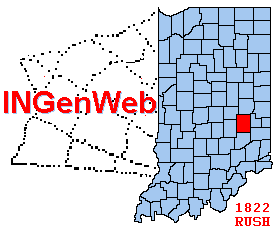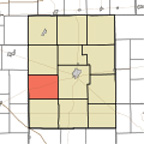

Rush County, Indiana
Genealogy
and History


Rush County, Indiana
Genealogy
and History
Centennial history of Rush County, Indiana Transcribed for the Rush Co. INGenWeb Project by Mark S. Mount
Authors: Anonymous
City of Publication: Indianapolis
Publisher: Historical Pub. Co.
Date: 1921

This is one of the smaller townships in the county, haning but thirty sections in it, six east and west and five north and south. It is bounded on the north by Posey township, on the east by Rushville township, on the south by Orange township and on the west by Shelby county. Manilla, a flourishing town of about 500 population iin the western part of the township, lying in sections 14 and 15, and Homer, a busy village in section 18, about the center of the township, are excellent shipping and commercial points on the Pennsylvania railroad. The surface of the township is generally flat, though there is some rolling land, and the natural drainage provided by the sluggish Mud creek and its equally sluggish tributaries has been supplemented by considerable ditching which was found necessary to reclaim large sections of swamp lands which in the early days were regarded as practically valueless but which now are excellent farm lands. On account of the presence here of much swamp land and also because it was farther west than the other townships on the same tier in the county settlement of Walker township was not effected as early as in its neighboring township to the east, very few pioneers having been found there prior to 1824. In this year a considerable "colony" of Kentuckians came up from Fleming county and established themselves in the township, their presence stimulating further settlement until in the next two or three years pretty much all the available land had been taken up and most of it represented by established homes. In the list of pioneers of this township are found the names of John Goddard and his son Joseph, James Davis, Landon Gardner, Landy Hurst, William Burgess, Daniel Jones, Oliver Norman, Reuben Hefflin, David Peters, Fielding Hurst, Joshua Hefflin, James Rogers, Collins Hefflin, Frederick and Jacob Mull, Wright Donnelly, Isaac Baltis, Mr. Warfield, Samuel Wilson, Edward Inlow, J. Webb, William Glass, Edward Riley, Samuel Watson, Jacob Hendricks, Peter Carpenter, Dean Willis, Benjamin Plummer, Paul Folger, William Davis, Thomas and Barnard Macy, John Bramble, Reuben Conrad, Benjamin Elder, John Fouch, James and Reuben Alexander, James Goddard, John Heaton, David Peters, John English, James Fouch, Aaron Rollins, George Thomas, Isaac Hilligoss, Andrew Elder, Jacob Goddard, Eli Hill, Johnathan Murphy, Daniel Thomas, Doctor Huston, Gilbert Edwards, Coleman Rollins, William S. Hilligoss, Benjamin Plummer, Josiah and Alexander Miller, James Morrison, George and James Mahin, Emmons Hurst, James Emmons, John Alexander, Levi Hilligoss, Squire McCorkle, William Gates, Fred J. and Michael Hael, Michael Kney, Joseph Tomes, William Hodge, William Westerfield, David and John Dearinger, Fred Koontz, Casper and James Johnson, James Collins, John Webb and William Hunter.
Manilla - This is the chief town of Walker township and is situated almost on the western edge of the county. It is a good shipping point on the Pennsylvania railroad and has a bank, a grain elevator, a commissioned high school, two churches and the essential business houses and industrial establishments to carry on the business of the thriving community of which it is the center. The present (1921) pastor of the Methodist Episcopal church is the Rev. M. E. Abel and of the Christian church, Rev. J. P. Mars. Thomas K. Mull is president of the Manilla Bank and the Rush-Shelby Grain Company operates the grain elevator. The Postmistress, Miss Mary M. Inlow, who was commissioned on April 2, 1919, carries on a confectionery business in connection with the postoffice. General stores, John Gross and M. L. Heaton; hardware, J. E. Creed and Silverthorn & Hungerford; drugs, George J. Inlow; hotel, Mrs. A. B. Staniford; barber shops, E. H. Mahan and Oscar Passmore; garage, Frank Nichel; millinery, Blanche Fox; confectionery, Shook & Son; blacksmith, Edward Edwards. There is one physician in the village, Dr. W. E. Barnum, and one dentist, Dr. Charles W. Zike. Among the earlier physicians in the town may be mentioned the names of John Westerfield, J. W. Houston, James W. Trees, J. J. Inlow, John H.Spurrier and Armstrong and Ramey. The town has a flourishing lodge of Freemasons and a lodge of Red Men. When natural gas was developed in Rush county Manilla secured a good supply through local wells and is still using this convenient fuel although the pressure is nothing like it was in other days. It uses the Bell and Independent telephones and secures electric current for lighting purposes from Rushville. It was on Janurary 4, 1836, that the original plat of Manilla was filed for record, the town being "laid out" by Jacob Mull, Elias and Jonathan Murphy and Jonathan Edwards. At first the town was called Wilmington, but later was changed to Manilla, which name it ever since has borne, one of the two postoffices of that name in the United States. Inquiry among some of the old residents failed to reveal the source of the name. The first house in the town was a log cabin erected on the site of the present Trees homestead place. Jacob Mull was the first merchant and other early merchants were Woofolk and Riley & Frame. When the railroad was being constructed through there, in 1848, a sawmill was erected to get out timber for construction work. The first traiin ran over the line on July 4, 1850, and thereafter the growth of the village to its present stage was substantial, the community appreciating the advantage of a rail shipping point. One of the former industries of the town was a tannery which was erected in 1841 and a gristmill was erected in 1860. The Manilla Bank was organized by Thomas K. and Leonidas H. Mull in 1901 and has served as a great commercial convenience throughout that part of the county.
Homer - This is the second village in size in Walker township and is a pleasant place of about 200 souls, on the Pennsylvania railroad about the center of the township. The Arbuckle tile mill, one of the most extensive in this part of the state, is the chief industry in the place. There also is a good grain elevator and the several stores in the village supply the local wants of the community in the commercial way. The town has an excellent township school and there are two churches, the Christian and the Baptists being represented by congregations. The only lodge is that of the Odd Fellows. Homer grew up around a sawmill which was started by Nathan Murphy and Samuel Craig at that point in the late '40s to get out timber for the construction of the railroad and was at first know simply as "Slabtown," from the use of slabs from the sawmill for road repairs instead of the usual corduroy, but as the place grew this was regarded as hardly dignified enough and the classic name of Homer was given the station and the people there wouldnÕt trade that name for any other on the map. The town was platted in the summer of 1876. Among the early business men of the village may be mentioned J. Folger, Jesse Jarrett, James Andrews, Alexander Bridges, J. J. Emmons, J. T. Robertson, Uriah Thomas, Arbuckle & Son, S. C. Van Winkle and Jarrett & Innis.